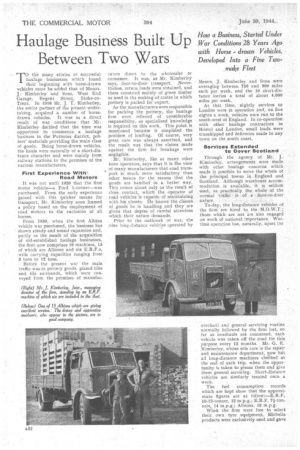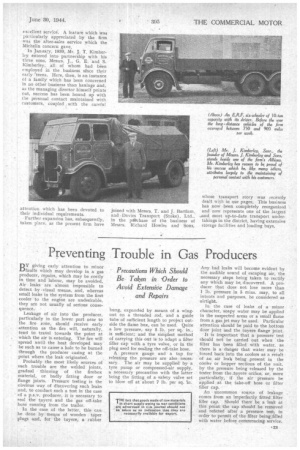Haulage Business Built Up Between Two Wars
Page 24

Page 25

If you've noticed an error in this article please click here to report it so we can fix it.
How a Business, Started Under War Conditions 28 Years Ago with Horse drawn Vehicles, Developed Into a Fine Two
make Fleet
the many stories of successful haulage businesses which found
their beginning with horse-drawn vehicles must be added that of Messrs. J. Kimberley and Sons, West End Garage, Regent Street, Stoke-onTrent. In 1916 Mr. J. T. Kimberley, the senior partner of the present undertaking, acquired a number of horsedrawn vehicles. It was as a direct result of war conditions that Mr, Kimberley decided that the time was opportune to commence a haulage business in the Potteries district, potters' materials providing the main class of goods. Being horse-drawn vehicles, the hauls were naturally of a short-distance character and were mainly from railway stations to the premises of the various manufacturers.
First Experience With' Road Motors It was not until 1926 that the first motor vehicle—a Ford 1-twiner—was purchased. From the early experience gained with this quicker means for transport, Mr. Kimberley soon framed a policy based on the employment of road motors to the exclusion of all horses.
From 1930, when the first Albion vehicle was purchased, the business has shown steady and sound expansion and, partly as the result of the acquisition of old-established haulage businesses, the fleet now comprises 19 machines, 13 of which are Albions and six E.R.F.s, with carrying capacities ranging from 3 tons to 12 tons.
Before the present war the main traffic was in pottery goods, glazed tiles and tile surrounds, which were conveyed from the premises of rnanufac turers direct to the wholesaler or consumer. It was, as Mr. Kimberley says, door-to-door transport. Nevertheless, return loads were obtained, and these consisted mainly of green timber as used in the making of crates in which pottery is packed for export.
As the manufacturers were responsible for packing the pottery, the haulage firm were relieved of considerable rs•ponsibilty, as specialized knowledge is required on this work, This point is mentioned because it simplified the problem of loading_ Of course, very great care was always exercised, and the result was that the claims made against the firm for breakage were negligible,
-Mr. Kimberley, like so many other keen operators, says that it is the view of many manufacturers that road transport is much more satisfactory than other means for the reason that the goods are handled in a better way. This comes about only as the result of close contact, which the operator of road vehicles is capable of maintaining with his clients. He knows the classes of goods he is handling and they are given that degree of careful attention which their nature demands.
Prior to the outbreak of war, the nine long-distance vehicles operated by
Messrs. J. Kimberley and Sons were averaging between 750 and 900 miles each per week, and the 10 short-distance lorries a total of about 4,000 miles per week.
At that• time, nightly services to London were in operation and, on five nights a week, vehicles were run to the south-west of England. In co-operation with other haulage contractors in Bristol and London, small loads were transhipped and deliveries made to any town on the south coast.
Services Extended to Cover Scotland Through the agency of Mr, J. Kimberley, arrangements were made with other haulage concerns which made it possible to serve the whole of the principal towns in England and Scotland. Although warehouse accommodation is available, it is seldom used, as practically the whole of the normal traffic is of a door-to-door nature.
• To-day, the long-distance vehicles of the firm are hired to the M.O.W.T.; those which are not are also engaged on work of national importance. Wartinie operation has, naturally, upset the overhaul and general servicing routine normally followed by the firm but, so far as overhauls are concerned, each vehicle was taken off the road for this purpose every 12 months. Mr. G. E. Kimberley, whose sole care is the repair and maintenance department, now has all long-distance machines chebred at the end of each trip, when the opportunity is taken to grease them and give them general servicing. Short-distance vehicles are similarly treated once a week.
The fuel consumption records which are kept show that the approximate figures are as follow:—E.R.F. 10-12-tonner. 12 m.p.g.; E.R.F. 7k-tonnets, 14 m.p.g.; Albions, 10 m.p.g. When the firm were free to select their, own tyre equipment, Michelin products were exclusively used and gave excellent service. A feature which was particularly appreciated by the firm was the after-sales service which the Michelin concern gave.
In Janaaty, 1939, Mr. J. T. Kimberley, entered into partnership with his three sons, Messrs. J., G. E. and S. Kimberley, all of whom had been employed in the business ance their early 'teens. Here, then, is an instance Of a family which has been concerned in no other business than haulage and, as the managing director himself points Out, success has been bound up with the personal contact maintained with customers, coupled with the careful attention which has been devoted to their individual requirements.
Further expansion has, subsequently, taken place, as the present firm have joined with Messrs. T. and J. Bartlarn, and Davies Transport (Stoke), Ltd., in the pifikhase of the business of Messrs. Richard Howles and Sons, whose transport story was recently dealt with in our pages. This business has now been completely reorganized and now represents one of the largest sand most up-to-date transport undertakings in the district, having extensive storage facilities and loading bays,




















































